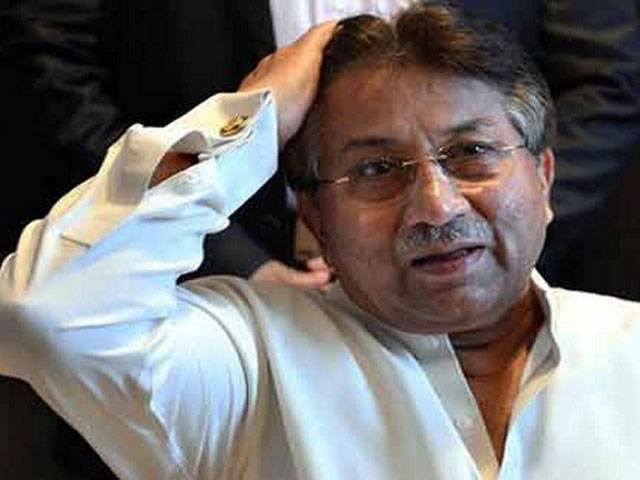LONDON/LAHORE - Lawyers for former president general (retd) Pervez Musharraf called on Friday for his treason trial to be suspended because they claim the government is colluding with elements of the judiciary to ‘fix and manipulate’ the proceedings.
The legal team said it based its claim on ‘leaked secret communication’ from an unnamed source in the office of Prime Minister Nawaz Sharif.
In a statement issued in London, the former military ruler's lawyers called for an ‘immediate and unconditional suspension of the Special Court and a comprehensive investigation’ into their claims.
They also urged King Abdullah of Saudi Arabia to intervene and support Musharraf in return for the former president's role in developing ‘brotherly relations’ between their countries.
Musharraf, 70, is the first former military ruler in Pakistan's history to face trial for treason and the case is viewed as a test of civilian authority over the powerful military.
He appeared in court on February 18, but since then has missed repeated hearings due to bomb scares and heart problems.
The special tribunal hearing the case last week ordered Musharraf to appear in person on March 31 or face arrest.
His lawyers said Sharif has "manipulated the legal process and used unlawful influence on the... judiciary to bring a barrage of unsubstantiated charges" against Musharraf, his long-time political rival.
They gave no specific details of their new claims, but said they had submitted them to the office of UN human rights chief Navi Pillay.
Musharraf's lawyers have already written to the UN urging it to intervene to stop what they call a ‘show trial’, claiming Sharif has handpicked the three judges hearing the case.
Toby Cadman, an international human rights lawyer on Musharraf's team, said: "There is an obvious conflict of interest between the judiciary in charge of the former president's trial and the issue at stake.
"The recent disclosure demonstrates the level of collusion between the executive and the courts."
The treason accusation relates to Musharraf's decision in 2007 to impose emergency rule shortly before the Supreme Court was due to decide on the legality of his re-election as president a month earlier, while he was still army chief.
Meanwhile, denying categorically all news concerning his disassociation from the prosecution of the high treason case against former military ruler Gen (r) Pervez Musharraf during a press conference in Lahore on Friday, chief prosecutor Akram Sheikh has said that he has neither made any such announcement nor does he intend to disassociate himself from the case before the special court.
“I have not made any such announcement and do not have any desire to disassociate myself from this historically important case,” said Akram Sheikh.
Highlighting importance of the high treason case, Akram Sheikh said it was a milestone in his career and he could not even think of disassociating him from the case which, he said, would turn the direction of the country.
He said when the arguments were in progress in the case in the special court on Thursday, the defence counsel accused him of biasness on which he offered the court to quit just because of professional ethics. However, he never made any announcement inside or outside the court that he had quit the case, Sheikh said. “I have contested many important matters of public interests during my career, but have never represented any military dictator in courts,” he asserted. He also made it clear that he had no personal grudge against anybody even against Musharraf.
Answering a question about Musharraf’s willingness to appear in the court on March 31 only in Sheikh’s absence, he said he had offered the court he would not attend the proceedings and charges against the accused could be framed in his absence.
“I neither want any privilege from the government nor do have any personal interest,” he said, adding, being a professional lawyer, he was performing his duty and was not loyal to anybody.
He further said the high treason case was neither a political case nor was it against any state institution. Musharraf was an army general and had he appeared in the court in the cases against him, public money would not have been spent on his security.
To another question about Musharraf’s exemption from appearance, Sheikh said there was no legal bar if he nominated someone to represent him in the court. When he asked whether Musharraf could go abroad, he replied he could not go abroad as the court had ordered to place his name on the Exit Control List.
Saturday, April 20, 2024
Mush lawyers call for trial suspension
Accuse govt of colluding with judiciary | Claim having secret communication of PM office

Caption: Mush lawyers call for trial suspension
Pak economy improving, funds will be provided on request: IMF
9:57 PM | April 19, 2024
Minister advocates for IT growth with public-private collaboration
9:57 PM | April 19, 2024
Judges' letter: IHC seeks suggestions from all judges
9:55 PM | April 19, 2024
Formula 1 returns to China for Round 5
9:05 PM | April 19, 2024
Germany head coach Julian Nagelsmann extends contract till 2026 World Cup
9:00 PM | April 19, 2024
A Tense Neighbourhood
April 19, 2024
Dubai Underwater
April 19, 2024
X Debate Continues
April 19, 2024
Hepatitis Challenge
April 18, 2024
IMF Predictions
April 18, 2024
Kite tragedy
April 19, 2024
Discipline dilemma
April 19, 2024
Urgent plea
April 19, 2024
Justice denied
April 18, 2024
AI dilemmas unveiled
April 18, 2024
ePaper - Nawaiwaqt
Advertisement
Nawaiwaqt Group | Copyright © 2024





